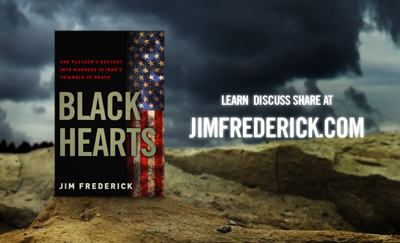
21 Aug 2010 15:13:30
It isn’t ordinary book for armchair war junkies. It's the true story about what Wilfred Owen called "the pity of war". The centre and the pity of Jim Frederick's account is the murder of the Janabis, an Iraqi family, and the rape of their 14-year-old daughter by four US soldiers. The most chilling aspect of the crime was the casual manner in which it was carried out. It was almost a jape – something to break the boredom of endless hours at a checkpoint. The soldiers did it because they had the power to do it; they didn't need a reason why – almost the invasion of Iraq in microcosm.
The rapists were from an infantry platoon in the US army's most elite division, the 101st Airborne, which provided "the Band of Brothers". It was the division sent by Eisenhower to enforce civil rights legislation and ensure that nine African-American children could attend Little Rock Central High School. It is associated with honour, not atrocity. It was only natural that it would be tasked with the most dangerous area of operations in the Iraq of 2005-06: the "Triangle of Death".
There are three basic things to avoid in war: getting killed, being convicted of war crimesand having a commanding officer who thinks you are useless. B Company's ill-fated 1st Platoon avoided none of these. By the end of their deployment, 11 of 1st Platoon's 33 members were dead or in jail for murder. Why? According to their commander, Lieutenant Colonel Thomas Kunk, it was all their fault: "You 1st Platoon are fucked up. Fucked up! Every single one of you!" Colonel Kunk was straight out of Catch-22. His officers referred to his control-freak outbursts as "getting Kunked" or being under the "Kunk gun". He seemed to have had every tact and empathy instinct removed: 1st Platoon's seven killed in action "were dead because of their failings", and the survivors were "quitters, crybabies and complainers". Such leadership is not unknown in the US military. Sometimes it works, but when it doesn't, the results can be bloody.
Everything that could go wrong did go wrong. The platoon's best leaders were killed early on, and the remaining soldiers were a mixture of seething resentment, indiscipline and combat exhaustion. Young soldiers on a battlefield packed with civilians need constant and close supervision. This didn't happen.
Frederick acknowledges the adrenaline buzz of battle but does not attempt to gloss over war's inherently brutal and dehumanising nature. He is also a master at describing the psychological effects. The most feared weapon of today's wars is the ubiquitous IED (improvised explosive device). "There is nothing you can do . . . no release for the anger and adrenaline." The IED saps morale and spawns hate for the population: "How could you not want to kill them, too, for protecting the person who just tried to kill you?"
Black Hearts is the best book by far about the Iraq war – a rare combination of cold truth and warm compassion.
The rapists were from an infantry platoon in the US army's most elite division, the 101st Airborne, which provided "the Band of Brothers". It was the division sent by Eisenhower to enforce civil rights legislation and ensure that nine African-American children could attend Little Rock Central High School. It is associated with honour, not atrocity. It was only natural that it would be tasked with the most dangerous area of operations in the Iraq of 2005-06: the "Triangle of Death".
There are three basic things to avoid in war: getting killed, being convicted of war crimesand having a commanding officer who thinks you are useless. B Company's ill-fated 1st Platoon avoided none of these. By the end of their deployment, 11 of 1st Platoon's 33 members were dead or in jail for murder. Why? According to their commander, Lieutenant Colonel Thomas Kunk, it was all their fault: "You 1st Platoon are fucked up. Fucked up! Every single one of you!" Colonel Kunk was straight out of Catch-22. His officers referred to his control-freak outbursts as "getting Kunked" or being under the "Kunk gun". He seemed to have had every tact and empathy instinct removed: 1st Platoon's seven killed in action "were dead because of their failings", and the survivors were "quitters, crybabies and complainers". Such leadership is not unknown in the US military. Sometimes it works, but when it doesn't, the results can be bloody.
Everything that could go wrong did go wrong. The platoon's best leaders were killed early on, and the remaining soldiers were a mixture of seething resentment, indiscipline and combat exhaustion. Young soldiers on a battlefield packed with civilians need constant and close supervision. This didn't happen.
Frederick acknowledges the adrenaline buzz of battle but does not attempt to gloss over war's inherently brutal and dehumanising nature. He is also a master at describing the psychological effects. The most feared weapon of today's wars is the ubiquitous IED (improvised explosive device). "There is nothing you can do . . . no release for the anger and adrenaline." The IED saps morale and spawns hate for the population: "How could you not want to kill them, too, for protecting the person who just tried to kill you?"
Black Hearts is the best book by far about the Iraq war – a rare combination of cold truth and warm compassion.

